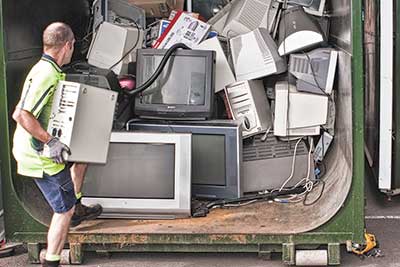Lake Macquarie City Council reached a major sustainability milestone in August, with one million kilograms of e-waste collected for recycling – equivalent in weight to 50,000 large analogue televisions.
Council’s Manager Sustainability, Dr Alice Howe, said the result was a clear indication of the City’s determination to take a smarter approach to waste.
“Lake Macquarie is the first local government area in the Hunter Region to hit the one million kilogram mark for e-waste, adding to our City’s solid performance in reducing waste to landfill.”
On average, Council is collecting more than 16,000 kg of e-waste a month.
These items are processed to extract precious metals such as copper, silver and gold as well as plastic, steel and glass that can be used to manufacture new goods.
“This result adds to the reductions we have achieved across all of our waste initiatives,” Dr Howe said.
Lake Macquarie City Council has been recognised as a strong performer in waste reduction in recent years, picking up several awards, including winning the Local Sustainability Award and the Organics Recovery Award at the 2014 NSW Local Government Excellence Awards.
Lake Macquarie residents are encouraged to recycle their e-waste during Council’s biannual kerbside bulk waste collection, or by dropping it off free-of-charge at the Community Recycling Centre, which also accepts household quantities of problem wastes such as paints, fluorescent light globes and tubes, gas bottles, fire extinguishers, household and car batteries and motor oils.
After a successful first year of operation in which more than 96 tonnes of household problem waste and more than 65 tonnes of e-waste were collected at the Community Recycling Centre, Council extended access to this service by introducing custom-built community recycling stations at its Customer Service Centre at Speers Point and at six of its Lake Macquarie library branches.
Dr Howe said the ease-of-access the service provides is essential to its success.
“Residents can access this network of stations to easily dispose of household problem waste that should not be disposed of in the regular kerbside bin service. Waste types collected include light globes, household batteries, smoke detectors and mobile phones and accessories.
“Many of these wastes contain toxic or hazardous substances that are potentially harmful to our health and the environment.”
Council also hosts a biannual Chemical CleanOut event at a local TAFE to collect many household chemicals and this event always proves popular with residents. At the last event, held in May, the community brought more than 500 vehicles to the event, where they took the opportunity to dispose of 16 tonnes of chemical waste.
Dr Howe said these initiatives are part of Council’s long-term waste reduction program.
“We have worked hard to make it easier for residents to safely dispose of a range of materials and keep potentially toxic materials from entering our landfill.
“These initiatives are working together to help efficiently manage residents’ waste and ensure the City stays on track to achieve its target of a 70 percent reduction in waste to landfill over 10 years.”

















